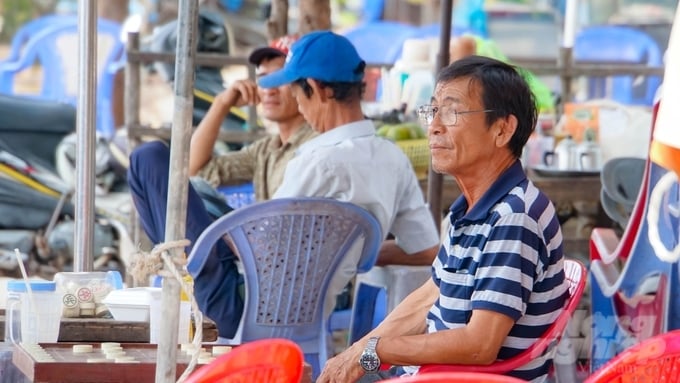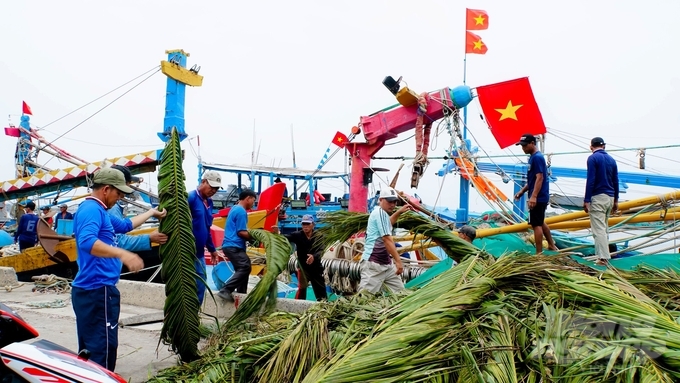June 1, 2025 | 04:07 GMT +7
June 1, 2025 | 04:07 GMT +7
Hotline: 0913.378.918
June 1, 2025 | 04:07 GMT +7
Hotline: 0913.378.918
Statistics from Ba Ria - Vung Tau Sub-Department of Fisheries show that the whole province has nearly 5,400 fishing boats, of which nearly 3,000 offshore fishing vessels. In 2023, the seafood industry of Ba Ria - Vung Tau achieved an output of over 360,000 tons of fishery products. However, according to the assessment, the province is unlikely to achieve this figure again when fishermen are constantly surrounded by "golden headbands" with no positive signs of the future.

Many fishermen fell into a deadlock because they could not leave the wharf due to fishing regulations, but they also could not change to other jobs immediately. Photo: Le Binh.
Since 2020 the number of fishing vessels in Ba Ria - Vung Tau has decreased by 20%, equivalent to nearly 1,200 units. The province had more than 5,800 ships, so far there are only nearly 4,700 ships left. One thing to note is that the decrease in number is mainly seen in fishing vessels of the near-shore fishing industry, or fishing vessels that affect fishery resources like fishing trawlers.
The province's policy orients gradual reduction in activities of the industry, encouraging fishermen to change jobs. As of the end of March 2023, the province has cut another 220 fishing vessels, currently 1,400 units left. There are also fewer signs of the group of ships exploiting the coastal areas.
Regarding this issue, Mr. Le Tong Van, Director of Ba Ria - Vung Tau Sub-Department of Fisheries, said that the province has a plan to develop the fishing industry in a sustainable way, gradually reducing to banning fishing activities that harm fishery resources and the ecological environment. At the same time, the province encourages fishing activities that are more environment-friendly such as seine nets, gillnets, sea fishing combined with squid capture.
Ba Ria - Vung Tau People's Committee has determined that along with the actions against illegal, undeclared and unregulated (IUU) fishing, preventing fishing vessels from overfishing or causing serious effects to the ecological environment is also a matter of urgency. Overfishing can deal a serious blow to fishing activities and the local economy in the near future, so the province resolutely implements measures to protect shrimp, fish and seafood resources in general.
Ms. Pham Thi Na, Deputy Director of Ba Ria - Vung Tau Department of Agriculture and Rural Development, said, “Over the past few years, by means of communication from the branches and levels of the province, most fishermen are aware of what is considered overfishing which affects fishery resources. However, not everyone has the conditions to change careers. Some of them are so poor that they tend to do risky things”.

Ba Ria - Vung Tau is trying to implement many solutions to support and accompany people to feel safe when going out to the sea or change jobs to protect fish and shrimp resources. Photo: Minh Sang.
Reporters of Vietnam Agriculture News were present at Bai Truoc Port (Vung Tau city). When asked about changing jobs, many fishermen said that the most difficult thing was the lack of capital. Mr. Nguyen Van Dien, a fisherman who used to practice trawling for many years gave out a sigh. After he accepted reality and stopped the harmful fishing practice, he was still unable to change to a different fishing path. According to Mr. Dien, it requires a large amount of capital to make a complete change, but accessing loans from the State's support policies is extremely difficult.
“It is very difficult to change the fishing habits that I have been familiar with so far. It takes time to get used to things. Finding a talent who can see the flow of floating fish, choose the water or the fishing spot is also extremely difficult. If you go fishing with gill nets, you must know how to patch nets, blow nets, and tie poles,” the fisherman said. Mr. Dien’s temporary option is to follow other ships to accumulate experience. He also thinks of this as an opportunity to earn money to get by.
According to Mr. Phan Thach, Chairman of the People's Committee of Phuoc Tinh commune (Long Dien district), it is difficult for ship owners to find a partner now because even their children do not follow the business. They even ask through "middlemen" to find inexperienced people to fill In the spot. This is, in a sense, a big gamble. This may affect both the amount of seafood caught and the stability of human resources.
“The Ministry of Agriculture and Rural Development is looking for units to transfer fishing technology to fishermen in a methodical way. If we want fishing to be sustainable and solidify its position as a key industry, the importance of human resource training needs to be paid due attention, with sufficient skills and qualifications,” said Mr. Thach.
Translated by Samuel Pham

(VAN) Several scientists and farmers are experimenting with soil treatment in some key durian-growing regions such as Cai Lay (Tien Giang), Dak Song, Gia Nghia, and Dak R’lap (Dak Nong).
/2025/05/25/4127-3-073637_820.jpg)
(VAN) Thanks to the promotion from an FAO-implemented project, vegetable production in greenhouses in Moc Chau has seen strong development, from 1.5 hectares in 2021 to nearly 50 hectares in 2024.

(VAN) FAO has recently supported USD 140,000 to implement the project 'Risk mitigation human-animal interface risks through disease control initiatives in pig farming.'

(VAN) The People's Committee of Tra Vinh province has approved an adjustment to the investment policy for the Green Hydrogen Plant project, increasing its area to approximately 52.76 hectares.
![Reducing emissions from rice fields: [2] Farmers’ commitment to the soil](https://t.ex-cdn.com/nongnghiepmoitruong.vn/608w/files/news/2025/05/05/dsc08881jpg-nongnghiep-140632.jpg)
(VAN) Clean rice cultivation model in Thuong Tan commune, Bac Tan Uyen district, is assisting local residents in achieving sustainable agriculture by substantially reducing costs, increasing productivity, and protecting the environment.

(VAN) At the conference to disseminate Resolution No. 68, AgriS introduced its digital agricultural ecosystem and reaffirmed its commitment to accompanying the Government in promoting private sector development and sustainable agriculture.

(VAN) 'Blue Ocean - Blue Foods' initiative is designed to restore marine ecosystems and establish sustainable livelihoods for local communities by cultivating a minimum of 1,000 hectares of cottonii seaweed in the first three years.